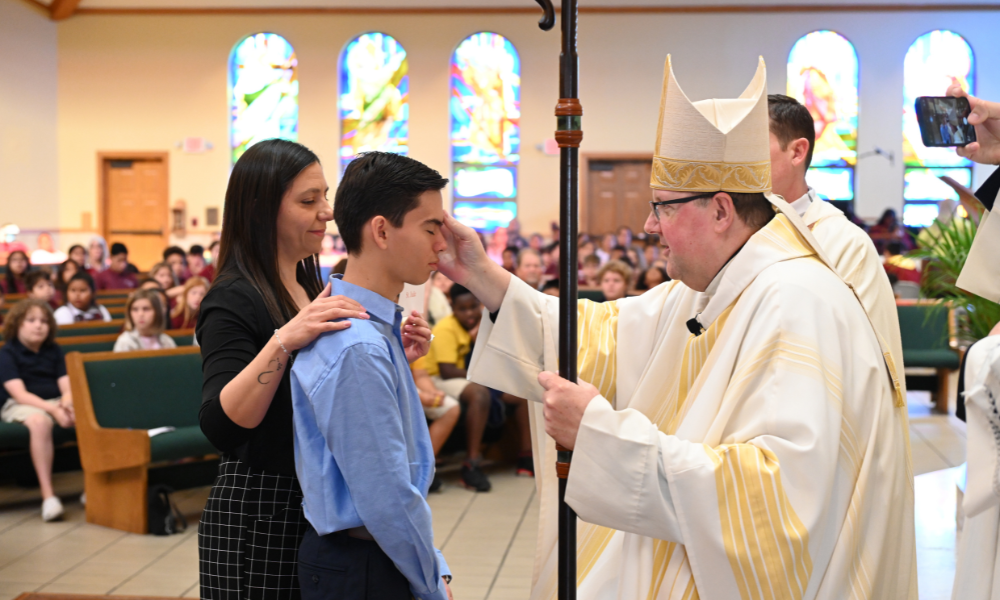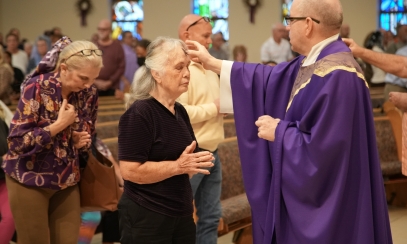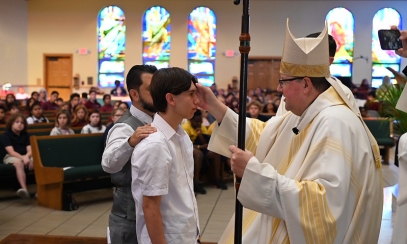
Received, Sealed, Sent: The Sacrament of Confirmation
Getting your Trinity Audio player ready...As we enter confirmation season, it is important to understand the true nature of the sacrament.
As we enter confirmation season, it is important to understand the true nature of the sacrament.
Of all of the sacraments, Confirmation is arguably the most misunderstood. Often described as the “coming of age” or “Catholic graduation,” the sacrament of Confirmation is sometimes viewed as the end of the faith life. However, this is an incorrect understanding.
Late spring is typically the time of year that Confirmations take place at parishes around the diocese.
The Catechism of the Catholic Church #1285 explains that in “the sacrament of Confirmation, [the baptized] are more perfectly bound to the Church and are enriched with a special strength of the Holy Spirit. Hence, they are, as true witnesses of Christ, more strictly obliged to spread and defend the faith by word and deed.”
Through this sacrament, those that have been baptized are strengthened by the Holy Spirit to make a commitment to live as witnesses to Christ in both word and deed. This is directly connected with Baptism as the confirmandi are sealed with the Holy Spirit. The sacrament of Confirmation also connects the faithful to the larger, universal Church and assists them in being living members of the Body of Christ.
In most dioceses around the world, baptized children receive the sacrament of Confirmation around 13-15 years old, but in some areas, they are confirmed once they reach the age of reason (around seven years old) prior to making their First Communion. Adults who enter the Church at Easter also receive the sacrament of Confirmation, typically at the Easter Vigil Mass.
During the rite , baptismal promises are renewed, and the bishop (or priest if an exception is made) extends his hand over each individual confirmand and invokes the Holy Spirit. Each confirmand is then anointed with the sacred chrism oil, consecrated at the Chrism Mass each spring, as the words “Be sealed with the gift of the Holy Spirit” are spoken over them.
When Jesus was baptized by John the Baptist in the Jordan River, the Holy Spirit came down upon him and he then began his ministry. The Apostles themselves also experienced Confirmation both in times that the Apostles laid hands upon the people of Samaria who received the Holy Spirit as well as at Pentecost when the Holy Spirit came upon them in the upper room before they evangelized the world.
We are all called to be living examples of Christ and members of his Church at all points in our lives, but the sacrament of Confirmation allows the Holy Spirit to strengthen us in conjunction with our baptism to fully live as disciples of Jesus, sent out to the world around us.
Therefore, it is vital for all who have been confirmed and all those celebrating their Confirmation this year to remember that this sacrament is not an end or a graduation. In many ways, this marks the beginning of truly living out the faith.



